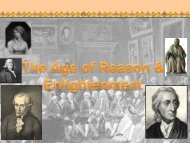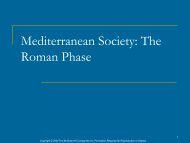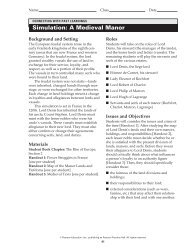Create successful ePaper yourself
Turn your PDF publications into a flip-book with our unique Google optimized e-Paper software.
By: Susan M. Pojer & Brett Coffman<br />
Liberty High School, Liberty, MO<br />
Horace Greeley H.S. Chappaqua, NY
The Geography of <strong>Greece</strong>
Bronze Age <strong>Greece</strong>
Crete: Minoan Civilization<br />
(Palace at Knossos)
Many parts of early Greek history are still a mystery, but<br />
we do know that two distinct cultures developed in early<br />
<strong>Greece</strong>.<br />
The Minoans of Crete<br />
• Minoan civilization developed<br />
as early as 3000 BC<br />
• Lasted nearly 2,000 years<br />
Minoans and Mycenaeans<br />
• Minoan ships sailed over<br />
Aegean Sea, possibly farther<br />
• Colonies established on dozens<br />
of Aegean islands<br />
• Ships filled with trade goods<br />
sailed back and forth between<br />
Crete and her colonies<br />
Excavations at Knossos<br />
• Much of Minoan life<br />
revealed by excavations<br />
– Solidly constructed buildings<br />
– Private rooms<br />
– Basic plumbing<br />
– Brightly colored artwork<br />
– Artwork shows life tied to sea,<br />
women as priests, dangerous<br />
games
Knossos: Minoan Civilization
Minoan Civilization
Speculation<br />
• Much history of Minoan civilization result of guesswork, speculation<br />
– Historians cannot read Minoans’ writing, Linear A.<br />
– Does not appear to be related to languages of mainland <strong>Greece</strong><br />
• Until writing deciphered, most knowledge will come from art, objects<br />
Rapid Decline<br />
• Minoan civilization fell apart rather suddenly, possibly from disaster.<br />
– Large eruption of volcanic island near Crete may have affected<br />
worldwide weather patterns.<br />
– Damage to Minoan ports, crops may have weakened society<br />
• Minoans conquered by warlike Mycenaeans
The Mycenaean Civilization
The Mycenaean States<br />
• Mycenaeans built small<br />
kingdoms, often fought with<br />
each other<br />
• Name comes from fortress,<br />
Mycenae<br />
Minoan Influences<br />
• Mycenaeans traded with<br />
Minoans, copied writing<br />
• Became great traders<br />
• Trade increased after they<br />
conquered Crete<br />
Mycenaeans<br />
First Greeks<br />
• Mycenaeans considered first<br />
Greeks, spoke form of Greek<br />
language<br />
• Earliest kingdoms owed much<br />
to Minoans<br />
Mycenaean Differences<br />
• Society dominated by intense<br />
competition, frequent warfare,<br />
powerful kings<br />
• Kings taxed trade, farming to<br />
build palaces, high walls
Mycenaean Strength<br />
• To show off strength, Mycenaeans built great monuments like Lion’s Gate<br />
• Kings’ constant quest for power, glory inspired legends<br />
• Most famous, story of Trojan War<br />
Trojan War<br />
Downfall<br />
Mycenaean Strengths and Downfall<br />
• War supposedly involved early Greeks, led by Mycenae, who fought powerful<br />
city called Troy, in what is now Turkey<br />
• War may not have happened, but ruins of city believed to be Troy found<br />
• War played part in end of Mycenaean civilization, as did drought, famine<br />
• By end of 1100s BC, Mycenaean cities mostly in ruins; dark age followed<br />
• Greek civilization almost disappeared
A new type of society emerged in <strong>Greece</strong> in the 800s BC. The society<br />
was centered on the polis, or city-state. Each polis developed<br />
independently, with its own form of government, laws and customs.<br />
Life in the Polis<br />
• Polis, center of<br />
daily life, culture<br />
• Greeks fiercely<br />
loyal to their polis<br />
• Did not think of<br />
selves as Greeks,<br />
but as residents of<br />
their particular citystate<br />
Greek City-States<br />
Infrastructure<br />
• Polis built around<br />
high area, called<br />
acropolis<br />
• Acropolis used as<br />
fortification<br />
• Included temples,<br />
ceremonial spaces<br />
• Agora, public<br />
marketplace, below<br />
Other Attributes<br />
• Shops, houses,<br />
temples near agora<br />
• Gymnasium,<br />
athletes’ training<br />
grounds, public<br />
bath<br />
• Sturdy wall for<br />
defense<br />
surrounded polis
Phidias’ Acropolis
The Acropolis Today
The Agora
Political Systems of Greek City-States<br />
Each major polis had a different political<br />
system that developed over time.<br />
• Corinth, an oligarchy, ruled by a few individuals<br />
• Athens, birthplace of democracy<br />
• Sparta, one of mightiest city-states, but least typical
SPARTA
Beginnings<br />
• Sparta located on Peloponnesus, large peninsula of southern <strong>Greece</strong><br />
• First surrounded by smaller towns; over time Sparta seized control of towns<br />
• After conquering town of Messenia, Spartans made Messenians into helots<br />
Helots<br />
War<br />
The Might of Sparta<br />
• Helots were state slaves given to Spartan citizens to work on farms so<br />
citizens did not have to perform manual labor.<br />
• As result, Spartan citizens free to spend time training for war<br />
• Spartan emphasis on war not due to fondness for fighting, but as way to<br />
keep order in society<br />
• Helots outnumbered Spartans seven to one, kept in check by strong army
SPARTA<br />
Helots Messenians enslaved by the<br />
Spartans.
To support their military lifestyle, the Spartans demanded strength and<br />
toughness. All babies were examined after birth and unhealthy children<br />
were left in the wild to die.<br />
Combat School<br />
• Boys taught physical, mental<br />
toughness by mothers until age 7<br />
• Entered combat school to toughen<br />
for hardships of being soldier<br />
• At age 20 boys became hoplites,<br />
foot soldiers; remained in army 10<br />
years before becoming citizens<br />
Militaristic State<br />
Women in Society<br />
• Unusual among Greek city-states<br />
• Women played important role<br />
• Trained in gymnastics for physical<br />
fitness, to bear strong children<br />
• Women had right to own property,<br />
unlike women in most of <strong>Greece</strong><br />
Sparta was led by two kings who served as military commanders.<br />
Decision-making was largely left to an elected council of elders.
Hercules and Theseus<br />
• Greeks also told myths about<br />
heroes, used to teach Greeks<br />
where they came from, what<br />
kind of people they should be<br />
• Some heroes, like Hercules,<br />
who had godlike strength,<br />
renowned through all <strong>Greece</strong><br />
• Others, like Theseus, who killed<br />
Minotaur of Crete, famous<br />
chiefly in home cities<br />
Myths about Heroes<br />
Lessons<br />
• Heroes killed monsters, made<br />
discoveries, founded cities,<br />
talked with gods on equal terms<br />
• Examples inspired individuals,<br />
whole city-states, to achieve<br />
great things<br />
• Hubris, great pride, brought<br />
many heroes to tragic ends<br />
• Served as lessons not to<br />
overstretch abilities
• 12 gods, goddesses were particularly influential in Greek lives<br />
• These 12 lived together on Mount Olympus, highest mountain in<br />
<strong>Greece</strong><br />
• Olympian gods thought to have great power, though not perfect<br />
• Myths say gods flawed, often unpredictable—loved, hated, argued,<br />
made mistakes, got jealous, played tricks on each other<br />
Worship<br />
• Almost all Greeks worshipped<br />
same gods<br />
• Each polis claimed one god,<br />
goddess as special protector<br />
• Example: Athens sacred to Athena<br />
• Some locations considered sacred<br />
by all Greeks<br />
Mount Olympus<br />
Sacred Locations<br />
• Delphi sacred to all Greeks—<br />
priestesses of Apollo were thought<br />
to receive visions of future<br />
• Olympia—every four years Greeks<br />
assembled there for Olympic<br />
Games; athletes competed against<br />
each other to honor gods
Legends and Myths<br />
• Much of what is known about<br />
early <strong>Greece</strong> comes from<br />
studying Greeks’ legends,<br />
myths<br />
• Myths, stories told to explain<br />
natural phenomena, events of<br />
distant past<br />
• Greek myths explained where<br />
they came from, how they<br />
should live, cope with uncertain<br />
world<br />
Gods and Heroes<br />
The Gods of Olympus<br />
• Ancient Greeks believed in<br />
hundreds of gods, goddesses;<br />
each governed one aspect of<br />
nature, life<br />
• Example: Apollo controlled<br />
movement of sun; sister Artemis<br />
did same for moon<br />
• Greeks believed gods would<br />
protect them, city-states in<br />
exchange for proper rituals,<br />
sacrifices
Homer: The “Heroic Age”
The Mask of Agamemnon
ATHENS: Yesterday & Today
Early Athenian Lawgivers<br />
$ Draco<br />
“draconian”<br />
$ Solon<br />
$ Cleisthenes<br />
created the first<br />
democracy!
The prosperity of Athens was due in large part to its stable and<br />
effective government. That government was the world’s first<br />
democracy, a form of government run by the people.<br />
Beginnings<br />
• Athens, birthplace<br />
of democracy<br />
• Not always<br />
democratic city<br />
• First ruled by kings<br />
• Later ruled by<br />
aristocrats who had<br />
money and power<br />
Athenian Democracy<br />
Reform<br />
• Most Athenians<br />
poor, had little<br />
power over lives<br />
• Gap between rich,<br />
poor led to conflict<br />
• Official named<br />
Draco reformed<br />
laws<br />
Draconian Laws<br />
• Draco thought way<br />
to end unrest was<br />
through harsh<br />
punishment<br />
• Belief reflected in<br />
Draco’s laws<br />
• Harshness of laws<br />
worsened dispute<br />
between classes
Phalanx
Piraeus: Athens’ Port City
Revision of Draconian Laws<br />
• 590s BC, lawmaker Solon<br />
revised laws again, overturned<br />
Draco’s harshest laws<br />
• Outlawed debt slavery; tried to<br />
reduce poverty by encouraging<br />
trade<br />
• Allowed all Athenian men to<br />
take part in assembly that<br />
governed city, serve on juries<br />
• Only wealthy men could run for,<br />
hold political office<br />
Solon and Peisistratus<br />
Peisistratus<br />
• Solon’s laws relieved tension<br />
for a time, did not resolve it<br />
• Tensions flared again after a<br />
few decades<br />
• 541 BC, politician Peisistratus<br />
took advantage of conflict,<br />
seized power<br />
• Peisistratus a tyrant<br />
• Claimed to rule for good of<br />
people<br />
• Violent but popular<br />
• People liked fact that he pushed<br />
aristocrats out, increased trade
Cleisthenes<br />
Cleisthenes took over Athens after Peisistratus<br />
• Reforms set stage for Athenian democracy<br />
• Cleisthenes broke up power of noble families<br />
– Divided Athens into 10 tribes based on where people lived<br />
– Made tribes, not families, social groups, basis for elections<br />
– Each tribe elected 50 men to serve on Council of 500, proposed<br />
laws<br />
– Each tribe elected one general to lead Athenian army
The Nature of Athenian Democracy<br />
• As democracy, Athens ruled by the people, but not all people able to<br />
take part in government; only about 10 percent of total population<br />
• Only free male Athenians over age 20 who had completed military<br />
training allowed to vote<br />
• Women, immigrants, children, slaves had no role in government<br />
Athenian Government<br />
• Those allowed to take part in government expected to:<br />
– Vote in all elections<br />
– Serve in office if elected<br />
– Serve on juries<br />
– Serve in military during war
Three Main Bodies<br />
• Athenian democracy consisted<br />
of three main bodies—<br />
• Assembly<br />
• Council of 500<br />
• Courts<br />
Council of 500<br />
• Created by Cleisthenes<br />
• Wrote laws to be voted on<br />
by full assembly<br />
Height of Democracy<br />
Assembly<br />
• Included everyone eligible to<br />
serve in government<br />
• All present voted on laws, all<br />
important decisions<br />
• Called direct democracy<br />
Courts<br />
• Complex series of courts<br />
• Members could number up to<br />
6,000<br />
• Chosen from the assembly<br />
• Heard trials, sentenced<br />
criminals
Elected Officials<br />
• Most governing done by<br />
assembly<br />
• Some elected officials had<br />
special roles<br />
• Among elected officials,<br />
generals who led city in<br />
war<br />
• Another elected official,<br />
the archon<br />
Special Roles<br />
Archon<br />
• The archon acted as head<br />
of both assembly, Council<br />
of 500<br />
• Archons elected for term<br />
of one year, but could be<br />
re-elected many times<br />
• Public servant, could be<br />
removed from office,<br />
punished if failed to serve<br />
people well
Persian Wars: 499 BCE – 480 BCE
In the early 400s BC, the Greek city-states came into conflict with the<br />
vast Persian Empire, a larger, stronger opponent.<br />
Causes of the Conflict<br />
• Roots of Persian Wars lay in<br />
region of Ionia, in what is now<br />
Turkey<br />
• Ionian city-states founded as<br />
Greek colonies, fell under<br />
Persian rule, 500s BC<br />
– Ionian Greeks unhappy with<br />
Persian rule<br />
– Wanted independence<br />
– Rebelled, 499 BC<br />
The Persian Wars<br />
Revenge<br />
• Ionian Greeks asked fellow<br />
Greeks for help<br />
• Athens sent aid, ships<br />
• Persians put down revolt<br />
– Revolt made Persian emperor<br />
Darius angry enough to seek<br />
revenge<br />
– Planned to punish Ionians’ allies,<br />
especially Athens, by attacking<br />
Greek mainland
Persian Wars: Famous Battles<br />
$ Marathon (490 BCE)<br />
26 miles from Athens<br />
$ Thermopylae (480 BCE)<br />
300 Spartans at the<br />
Mountain pass<br />
$ Salamis (480 BCE)<br />
Athenian navy victorious
The First Persian Invasion<br />
• 490 BC, Persians set out to fulfill Darius’s plans for revenge<br />
• Fleet carrying tens of thousands of Persian troops set out for <strong>Greece</strong><br />
• Came ashore near town of Marathon, not far from Athens<br />
Persian Retreat<br />
Marathon<br />
First Invasion<br />
• Warned in advance, Greeks arrived at Marathon, caught Persians unloading<br />
ships, charged in phalanx, tight rectangle formation<br />
• Persians counterattacked, more Greeks closed in, Persians retreated<br />
• Legend says Athenian messenger ran from Marathon to Athens after battle to<br />
announce Greek victory; died from exhaustion after delivering message<br />
• Legend inspired modern marathon, 26-mile race commemorating dedication,<br />
athleticism
Preparations for a Second Invasion<br />
• Greek victory at Marathon shocked both Greeks, Persians<br />
• Athenians could not believe they had defeated stronger foe<br />
• Persians humiliated, furious<br />
• Darius planned second invasion, but died before invasion launched<br />
• Son Xerxes vowed revenge, continued to plan attack on <strong>Greece</strong><br />
Xerxes<br />
• 480 BC, 10 years after first<br />
invasion, Xerxes set out for <strong>Greece</strong><br />
• Hundreds of thousands of soldiers,<br />
sailors, animals, weapons, supplies<br />
• Greek accounts say Persian army<br />
so huge took week to cross bridge<br />
built into <strong>Greece</strong><br />
Athenians<br />
• Faced with invasion, Athenians<br />
called on other Greek city-states to<br />
help fight off Persians<br />
• Athens, bitter rival, agreed to help<br />
• Had recently built large navy, took<br />
charge of Greek fighting ships<br />
• Sparta took charge of Greek armies
Second Invasion and Aftermath<br />
The Greeks worried that they would not have time to prepare their<br />
troops for battle. To slow down the Persians, a group of Spartans and<br />
their allies gathered in a mountain pass at Thermopylae, through which<br />
the Persians would pass to get into <strong>Greece</strong>.<br />
The Second Persian Invasion<br />
• Spartans held off entire Persian army<br />
for several days<br />
• Persians shown alternate path through<br />
mountains; were able to surround, kill<br />
Spartans<br />
• Spartans’ sacrifice bought time for<br />
Greeks’ defense<br />
After Thermopylae<br />
• Persians marched south to Athens,<br />
attacked, burned city; needed fleet<br />
to bring additional supplies<br />
• Athenian commander lured fleet<br />
into narrow strait<br />
• Greek warships cut them to pieces<br />
Persian army was no longer a match for the Greeks; and<br />
within a year the Greeks had won the Persian Wars.
Golden “Age of Pericles”:<br />
460 BCE – 429 BCE
As leaders in the Persian Wars, Athens and Sparta became the two<br />
most powerful, influential city-states in <strong>Greece</strong>. After the wars, Athens<br />
entered a golden age as the center of Greek culture and politics.<br />
Alliance<br />
• After Persian Wars<br />
city-states banded<br />
together to defend<br />
each other, punish<br />
Persia<br />
• Largest, richest of<br />
alliance members<br />
was Athens<br />
The Golden Age of Athens<br />
Delian League<br />
• Alliance’s treasury<br />
kept on islands of<br />
Delos<br />
• Alliance known as<br />
Delian League<br />
• Athens controlled<br />
ships, money<br />
• League grew in<br />
membership, power<br />
Increased Influence<br />
• Some members<br />
resented Athenian<br />
dominance<br />
• Members who tried<br />
to quit attacked by<br />
league fleet, forced<br />
back into alliance<br />
• League became<br />
Athenian empire
Life in the Golden Age<br />
Trade brought great wealth to Athens.<br />
• Merchants from other parts of world moved to city,<br />
bringing own foods, customs<br />
• Athens very cosmopolitan as result<br />
– Grand festivals, public celebrations, events<br />
– Athletic games and city theaters<br />
– Athens was the heart of Greek culture
Peloponnesian Wars
As the leader of the Delian League, Athens was the richest, mightiest<br />
polis in <strong>Greece</strong>. Being rich and mighty brought many powerful rivals,<br />
the greatest of which was Sparta, which wanted to end its dominance.<br />
Peloponnesian<br />
League<br />
• Sparta head of<br />
Peloponnesian<br />
League, allied citystates<br />
• Formed 500s BC,<br />
to provide<br />
protection, security<br />
for members<br />
The Peloponnesian War<br />
Tension Built<br />
• Tensions built<br />
between Delian,<br />
Peloponnesian<br />
Leagues<br />
• Mutual fear led to<br />
war between<br />
Athens, Sparta<br />
War<br />
• Athens feared<br />
military might of<br />
another league<br />
• Sparta feared loss<br />
of trading<br />
• 431 BC, the two<br />
declared war<br />
• Lasted many years
War in <strong>Greece</strong><br />
• Initially neither side gained much advantage<br />
• Sparta, allies dominated land; Athens, allies dominated sea<br />
• Athenians avoided land battles; neither side won more than minor victories<br />
Plague and Peace<br />
Sparta’s Victory<br />
The Course of War<br />
• 430, 429 BC, plague struck Athens, changed course of war<br />
• Pericles, Athens’ leader through beginning of war, among dead<br />
• After plague, fighting heated up until truce in 421 BC<br />
• 415 BC, war broke out again; Sparta took to sea as well as land, destroyed<br />
Athenian fleet; Athens surrendered 404 BC<br />
• Peloponnesian War almost destroyed Athens; Sparta also exhausted by war
Cycle of Warfare<br />
After victory, Sparta’s army tried to act as <strong>Greece</strong>’s<br />
dominant power<br />
• Sparta’s wealth, resources badly strained, power worn down<br />
• Spartans could not keep control of <strong>Greece</strong><br />
• City-state of Thebes defeated Sparta, could not maintain control<br />
either<br />
• Struggle for power led to long cycle of warfare that left all <strong>Greece</strong><br />
vulnerable to attack<br />
• 340s BC, Macedonia, Greek-speaking kingdom to north, swept in,<br />
took control of all <strong>Greece</strong>
Golden “Age of Pericles”:<br />
460 BCE – 429 BCE
Science<br />
Thales<br />
• First great Greek thinker (625<br />
B.C)<br />
• First Philosopher, First scientist<br />
• Mathematician, astronomer<br />
• Greatest contribution:<br />
“All events, even<br />
extraordinary ones, can be<br />
explained in natural terms<br />
that can be understood by<br />
humans.”<br />
• Water is the fundamental<br />
material
Science<br />
Pythagoras<br />
• Inventor of<br />
Mathematics<br />
• Created a system<br />
for expressing<br />
equations<br />
• Through numbers,<br />
all truth could be<br />
expressed<br />
(fundamental of<br />
the world)<br />
• Irrational numbers<br />
bad
Science<br />
• Pythagoras (cont)<br />
– Pythagorean<br />
theorem<br />
– Trigonometry<br />
– Music is based in<br />
mathematics<br />
• Principle of harmonic<br />
vibration<br />
• String length<br />
relationships<br />
(octaves, fifths, etc.)
Pythagoras<br />
• Discovered<br />
– Golden Mean<br />
(ratio of 1.618)<br />
• Body dimensions<br />
• Crosses
Golden Triangle and Rectangle<br />
• Golden Rectangle
• Golden Triangle<br />
Pythagoras<br />
– Isosceles with 72 and 36 degree angles<br />
– Used to construct the Golden Spiral<br />
– Dodecahedron forms a 5 pointed star<br />
made of Golden Triangles<br />
• Symbol of the Pythagoreans
•Ram’s<br />
horns<br />
•Sea<br />
shells<br />
•Flowers<br />
•Galaxies<br />
Golden Spirals
Science<br />
• Anaximander<br />
– Fire was the fundamental element<br />
• Heraclitus<br />
– Fundamental concept of change being<br />
constant<br />
– “No one can step in the same river twice”<br />
• Xeno<br />
– Any movement is impossible because you<br />
can divide all space in half<br />
• Democritus<br />
– Atomic Theory<br />
• Atoms were the fundamental of nature<br />
• solved the Xeno dilemma
Hellenistic Science<br />
• Euclid (320-260 BC)<br />
– Lived in Alexandria<br />
– Compiled Elements<br />
of Geometry<br />
• Used as a text book<br />
until 1900<br />
• Basis for Newtonian<br />
physics
Hellenistic Science<br />
• Archimedes (287-212<br />
BC)<br />
– Lived in Syracuse<br />
– Greatest scientist until<br />
Newton<br />
– Trained at Alexandria<br />
– Major discoveries in<br />
hydraulics, mathematics,<br />
mechanics, warfare, and<br />
astronomy
Archimedes – Hydraulics<br />
Macedonian<br />
Crown<br />
4 th c. BC<br />
• Invented a planetarium<br />
• Buoyancy – King’s crown<br />
The wreath and<br />
the gold have<br />
equal weight<br />
The wreath<br />
displaces<br />
more water
Archimedes – Mathematics<br />
• Geometric<br />
calculations<br />
– Area/volume of<br />
circle, sphere, cone<br />
• Developed system<br />
similar to calculus<br />
– Polygons inside circle<br />
with ever higher<br />
numbers of sides<br />
– Calculated value for<br />
pi (∏) to accuracy of<br />
0.0002<br />
• Devised Scientific<br />
notation (5 x 10 7 )
Archimedes – Mechanics<br />
• Levers<br />
–Defined theory<br />
• Pulleys<br />
–Challenge to<br />
drag a ship<br />
• Ship building<br />
–Giant ship<br />
–Cargo of 60<br />
ships
Archimedes – Warfare<br />
• War with the<br />
Romans<br />
– Claw cranes
Archimedes – Warfare<br />
• Catapults<br />
• Mirrors
Archimedes’ Creativity<br />
(Environment and Motivation)<br />
• Favor to the King<br />
– civic duty<br />
• Scientific curiosity<br />
• War<br />
• His opinion of his<br />
greatest<br />
accomplishment:<br />
– "Perfect" geometric shape<br />
which he asked to be<br />
inscribed on his tomb<br />
– Sphere inscribed in<br />
cylinder<br />
• Volume ratios = 3:2<br />
• Surface ratios = 3:2<br />
– Ratio of volumes and<br />
areas of cone, sphere and<br />
cylinder = 9:6:4
Hellenistic Science<br />
• Aristarchus of Samos (250 BC)<br />
– Purposed heliocentric universe<br />
• Eratosthenes<br />
– Calculated the<br />
circumference of<br />
the earth<br />
– Claimed a ship<br />
could sail around<br />
Africa to India<br />
– Claimed a ship<br />
could sail west<br />
to India
Philosophers
Hellenistic Philosophers<br />
$ Cynics Diogenes<br />
ignore social conventions &<br />
avoid luxuries.<br />
citizens of the world.<br />
live a humble, simple life.<br />
$ Epicureans Epicurus<br />
avoid pain & seek pleasure.<br />
all excess leads to pain!<br />
politics should be avoided.
Hellenistic Philosophers<br />
$ Stoics Zeno<br />
nature is the expansion of<br />
divine will.<br />
concept of natural law.<br />
get involved in politics, not<br />
for personal gain, but to<br />
perform virtuous acts for the<br />
good of all.<br />
true happiness is found in<br />
great achievements.
Hellenism: The Arts & Sciences<br />
$ Scientists / Mathematicians:<br />
Aristarchus heliocentric theory.<br />
Euclid geometry<br />
Archimedes pulley<br />
$ Hellenistic Art:<br />
More realistic; less ideal than<br />
Hellenic art.<br />
Showed individual emotions,<br />
wrinkles, and age!
Great Athenian Philosophers<br />
$ Socrates<br />
Know thyself!<br />
question everything<br />
only the pursuit of goodness<br />
brings happiness.<br />
$ Plato<br />
The Academy<br />
The world of the FORMS<br />
The Republic philosopher-king
Great Athenian Philosophers<br />
$ Aristotle<br />
The Lyceum<br />
“Golden Mean” [everything in<br />
moderation].<br />
Logic.<br />
Scientific method.
Athens: The Arts & Sciences<br />
$ DRAMA (tragedians):<br />
Aeschylus<br />
Sophocles<br />
Euripides<br />
$ THE SCIENCES:<br />
Pythagoras<br />
Democritus all matter made up of<br />
small atoms.<br />
Hippocrates “Father of Medicine”
The Parthenon
The <strong>Classical</strong> Greek “Ideal”
Olympia
The Ancient Olympics:<br />
Athletes & Trainers
Olympia: Temple to Hera
The 2004 Olympics
Macedonia Under Philip II
Alexander the Great
Alexander the Great’s Empire
Alexander the Great in Persia
The Hellenization of Asia
Pergamum: A Hellenistic City
The Economy of the Hellenistic World
The Breakup of Alexander’s Empire








